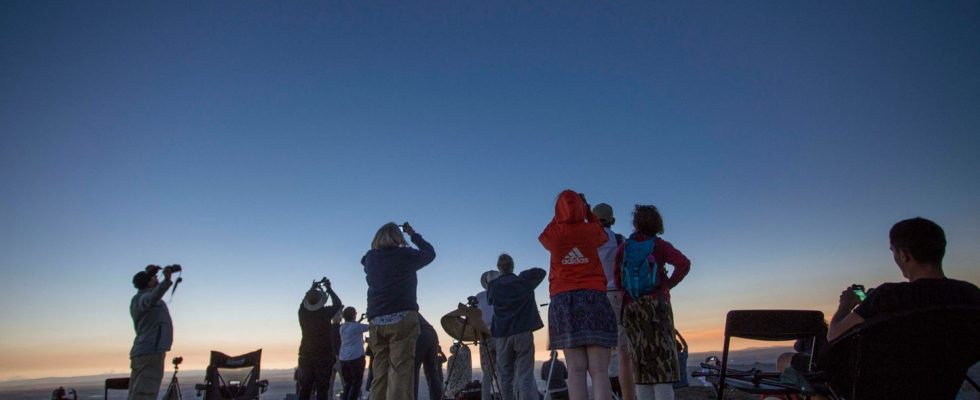A state of emergency is declared this Monday, April 8 in the Canadian state of Ontario. The reason ? An alignment of planets (and a star) and an estimated influx of a million tourists: all hoping to experience the fascinating spectacle of a total solar eclipse above the Niagara Falls. “If the weather is with them, it will be a magnificent moment. But real enthusiasts already know that in Eastern Canada, there is an 80% risk of not seeing it,” says Eric Piednoël, the general director of the French Astronomical Association (AFA). The latter preferred to play it safe. For her two current “eclipse trips”, prepared several years in advance, she chose the Pacific coast of Mexico, where the chances of enjoying this day of black sun are 80%. And Texas, whose rating is between 55 and 60%.
The association takes “less than a hundred” astronomical tourists to these two destinations. But Eric Piednoël estimates that for this eclipse which will sweep through an area that is “rather easy to access” – not like that of 2021 in Antarctica – “there are probably 3,000 to 4,000 French people who are making the trip solo”, saying organizing in adventurer mode. “There are a lot of them, that’s for sure!” », confirms Joël Vallée, whose Bordeaux astronomy shop, forty years old, has been drowning “for about two months” under orders and requests for “shipping throughout France” for glasses at 4 euros. he also sold around ten much more sophisticated devices such as coronagraphs, some of which cost up to 3,000 euros. An ocean separates the trader from the eclipse, but that doesn’t stop him from finding it “really great.”
So who are these tourists willing to travel thousands of miles and pay thousands of euros – 4,700 per person for the 15-day AFA trip to Mexico, and 4,300 for the 11-day trip to Texas – for a lights out in just under four minutes? “Those who leave with us tend to be middle or senior managers. There are also young retirees, who no longer have children at school, and these enthusiasts often take advantage of an eclipse to take the trip of the year,” explains Eric Piednoël.
A “timeless” family moment
Add the sensational to the journey. This is exactly what Jean-Michel and Françoise intended to do when, Thursday evening near Fontainebleau, they tried to fit their folding seats “purchased at Decathlon” into their suitcases before flying out of Roissy the next day. They are not “eclipse chaser” globetrotters. Jean-Michel is an enlightened amateur astronomer. He would have liked to make it his career, “but it seems that I was not good enough at maths, so I ended up being a veterinarian,” he jokes. He tried to see the eclipse of summer 2009 in Alsace. The weather thwarted his adventure.
This trip is an opportunity with their son Antoine, 19 years old, a student rather versed in aeronautics, to discover the United States for the first time “Without the eclipse, we would not have gone there”, they admit . Jean-Michel took his astronomical photographic equipment on board. Françoise “just wants to enjoy the moment”. She experienced the eclipse of 1999 in Paris and wants to “rediscover this suspended moment, outside of time”, hoping that “this dizziness” will allow her to “distance herself from the dramatic news” of the cows’ floor. For this unique experience, the family promised not to give in to the temptation of the selfie.
An inveterate hunter of flying shadows
This Monday (fingers crossed), Françoise, Jean-Michel and Antoine are normally on a farm in Texas, carefully selected by the AFA, unfolding their stools made in France. Near them, Jean Prelle spreads his usual white sheet to see “the flying shadows”. “It’s the reflection of the last rays of the Sun on the canyons of the Moon, we have the impression that the ground is starting to shake,” he describes, fascinated in advance. This retired business leader is one of those who, “as soon as they have seen an eclipse, they are already checking off the next one”. He’s on his twelfth, cheating a little, since he counts the one that his sixth-grade maths teacher made him look at – “this unconscious” – through dark glasses.
Already keen on astronomy, Jean Prelle had the revelation in 2002 when he experienced his first total eclipse in South Africa. “I said to myself, ‘I absolutely have to see some more’.” Since then, he has been “hunting”. Really. Even if it means going to Kenya for a dark night lasting just 17 seconds, spoiled by an unexpected rain cloud. Even if it means rerouting the bus route at the last minute depending on the weather. Or looking for a beach at 4 a.m. in Australia because the hotel parking lot turns out to be in the shadow of a big mountain.
The Spanish windfall in 2026
Like Jean-Michel, Jean Prelle avoided the Texan weather sites again on Thursday, so as not to worry unnecessarily about things over which he had no control. He likes chasing “these accelerated sunrises and sunsets”, “these hours of waiting where the sky gradually darkens” too. Those who know themselves to be “privileged” adore “this indefinable sensation of being in unison with our star”, and “this moment when special things happen, like a rooster that starts to crow when the birds stop to fly “.
Jealous ? Your turn will come. On August 12, 2026, all you have to do is go to northern Spain to experience a total solar eclipse. A year later, a “brush of shadow” will sweep Tunisia, Morocco and Egypt. Mysticism assured, the Sun will disappear above the Luxor temple. But don’t dream too much either. According to Eric Piednoël, American tour operators have jumped in and have already quadrupled prices…

